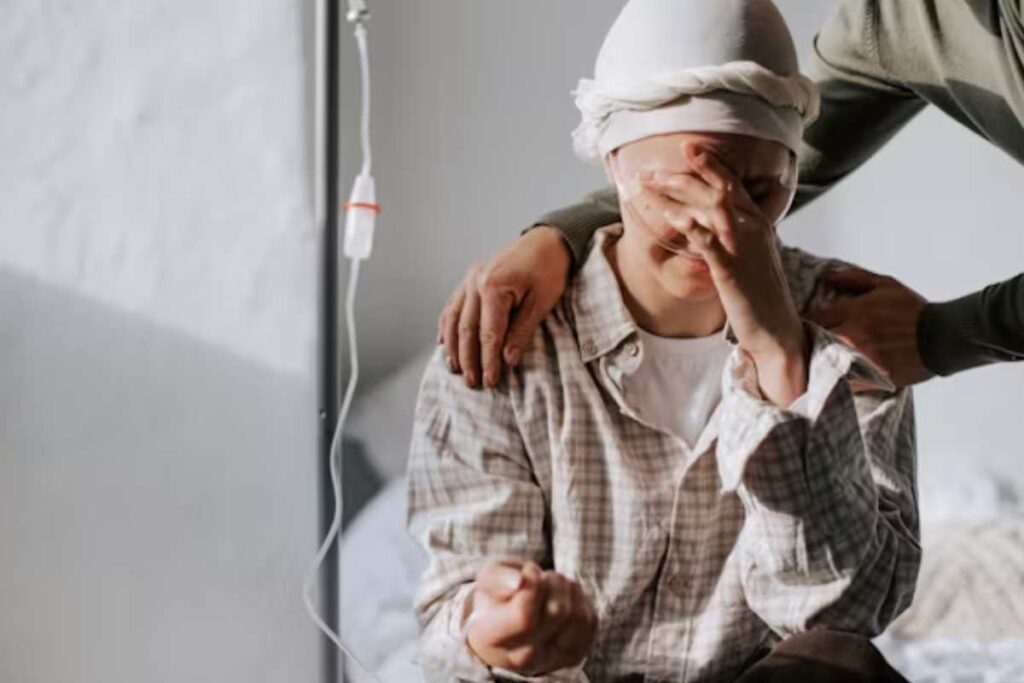The effects of chemotherapy can last after treatment or even manifest themselves years later. These include effects on the intelligence, heart, bones, nervous system, lungs, and other systems.
Chemotherapy is the most common cancer treatment. Aggressive drugs are used to slow the growth of cancer cells.
You may already be familiar with the short-term side effects of chemotherapy, such as hair damage and nausea.
Long-term side effects are less well known. These include those that begin during or shortly after chemotherapy and persist for a long time. They also include “late effects,” which may not appear until months or years after treatment.
This article discusses the possible long-term effects of chemotherapy. However, these vary depending on the patient, the type of cancer, and the chemotherapy drug used.
Cognitive difficulties
One of the short-term and long-term side effects of chemotherapy is confusion, often referred to as “chemo brain.” This includes problems with memory, concentration, and the ability to multitask. In some cases, these cognitive problems persist for years after treatment ends.
Chemotherapy can promote oxidative stress and inflammation, which impact cognitive function. However, other factors, such as the cancer itself or anxiety caused by a recent diagnosis, can also contribute to this symptom.
You may be able to stop or alleviate cognitive problems by:
- eating a stable diet
- getting enough sleep
- doing brain exercises
Hearing problems
Some chemotherapy drugs can cause long-term hearing loss. These include carboplatin and cisplatin.
Studies show that cisplatin may remain in the inner ear after action, contributing to hearing problems such as tinnitus. Higher doses and frequent actions may be associated with more severe hearing effects.
If you are undergoing chemotherapy with carboplatin or cisplatin, discuss the risks to your hearing with your doctor.
Heart problems
Chemotherapy can cause high blood pressure and heart disease, counting:
- arrhythmia
- myocardiopathy
- congestive heart failure
- carotid artery disease
- coronary artery illness
- damaged heart valves
- pericarditis
- pericardial fibrosis
- pericardial effusion
The risk of developing heart problems after chemotherapy is higher in people over 65 and in those who received advanced doses of certain drugs.
Chemotherapy drugs that damage the heart and cause problems with the circulatory system include:
Other drugs used to treat cancer may also increase the risk of heart problems.
If prescribed one of these drugs, your doctor will closely monitor your heart and blood system before, during, and after treatment. If problems arise, your doctor may change the dose, prescribe protective drugs, or stop treatment.
You can also protect your heart health throughout or after chemotherapy by eating a heart-healthy diet and exercising regularly.
Increased risk of additional cancers
Studies have linked chemotherapy to a small increased risk of blood cancer.
A 2018 education of 165,820 older adults who received chemotherapy for any solid cancer found an augmented risk of developing acute myeloid leukaemia or myelodysplasia within 5 years.
More investigation is needed to understand why these cancers develop and whether they can be banned. Your doctor can help you consider the risks and profits of your treatment.
Lung problems
Chemotherapy can cause inflammation and scarring of lung tissue. This can lead to lung problems that can develop years after treatment. Chemotherapy can increase the danger of:
- pulmonic fibrosis
- infections, like bronchitis or pneumonia
- pneumonitis
- acute respiratory disease syndrome
These conditions can cause indications such as chest tightness and shortness of breath.
Chemotherapy drugs linked to lung conditions include:
- bleomycin
- carmustine
- mitomycin
- methotrexate
Although it’s impossible to prevent lung damage from chemotherapy, you can take upkeep of your lungs by exercising regularly, avoiding lung nuisances, and quitting smoking if you smoke. Tell your doctor if you have symptoms such as difficulty breathing.
Nerve damage
Some chemotherapy drugs can damage the anxiety system and cause symptoms that can last for years (Trusted Source), such as:
- neuropathic pain, which causes boiling or tingling in your limbs
- reduced reflexes
- weakness
- muscle cramps
These symptoms are often seen in people taking platinum compounds (e.g., oxaliplatin) and taxanes (e.g., docetaxel).
Neuropathic pain is more likely to persevere if you have other conditions that put you at risk, such as diabetes.
Although there is no known way to prevent pain completely, it can be relieved by living a healthy lifestyle, taking prescribed medications, and wearing loose gloves and shoes.
Osteoporosis
Chemotherapy drugs can weaken bones, a condition called osteoporosis. It most often occurs in women during menopause, as it is also associated with loss of bone density.
Osteoporosis increases your risk of bone fracture. Your doctor may acclaim increasing your calcium intake, supplements, or bone-building medications to reduce your risk.
Reproductive changes
Chemotherapy drugs can affect hormones, sex life, and the reproductive system. In women, they can increase susceptibility to infections or cause premature menopause. In men, erectile dysfunction can occur.
Some chemotherapy drugs, such as alkylating agents, can cause infertility. Infertility may resolve after treatment, but in some cases, it may become permanent. The likelihood of this side effect depends on your overall health, age, and the type and dose of chemotherapy drug you receive.
Your doctor will make sure you know the risks associated with treatment. If you are concerned about your ability to have children, we may recommend freezing your eggs or banking your sperm before starting treatment. A fertility professional can help you explore your options.
How long do long-term side effects last?
The side effects of chemotherapy can last for months and sometimes years. This depends on your overall health and the type of chemotherapy you receive as treatment.
Some complications of chemotherapy are permanent. These may include damage to the respiratory, circulatory, sensory, excretory, and reproductive systems.
Before starting, discuss with your doctor or oncologist the possibility of permanent or long-term side effects.
Takeaway
Chemotherapy can cause several long-term side effects. They may start during treatment and continue after it ends. In other cases, they first appear at the end of therapy.
Side effects may vary liable on your health condition, the type of cancer you have, and other treatments you receive.
If you are undergoing therapy, discuss possible side effects with your doctor.


